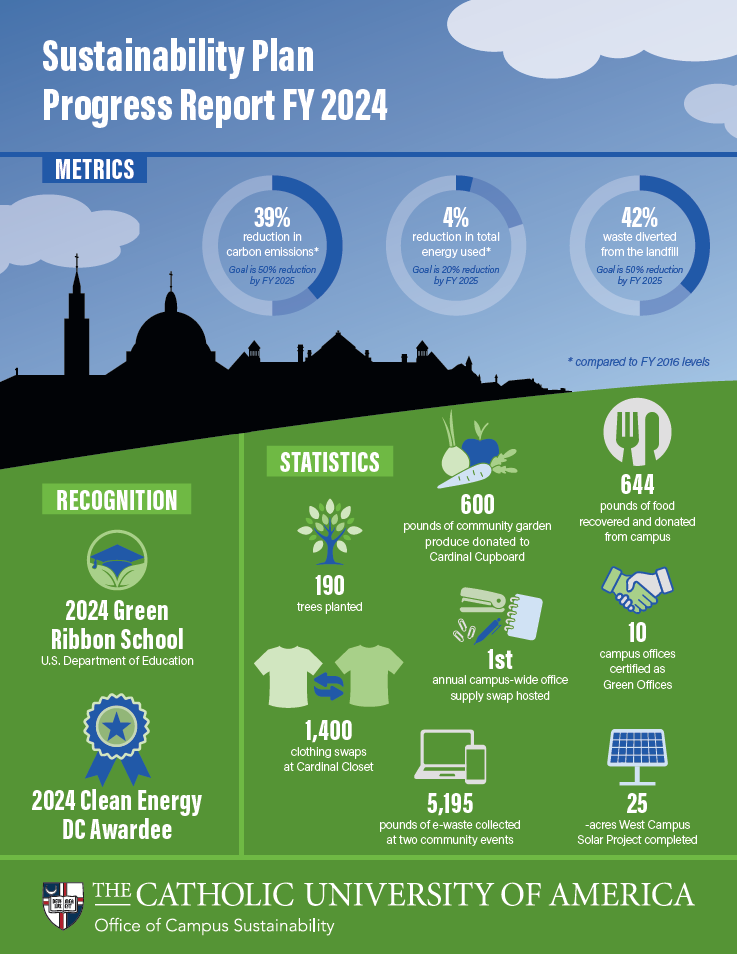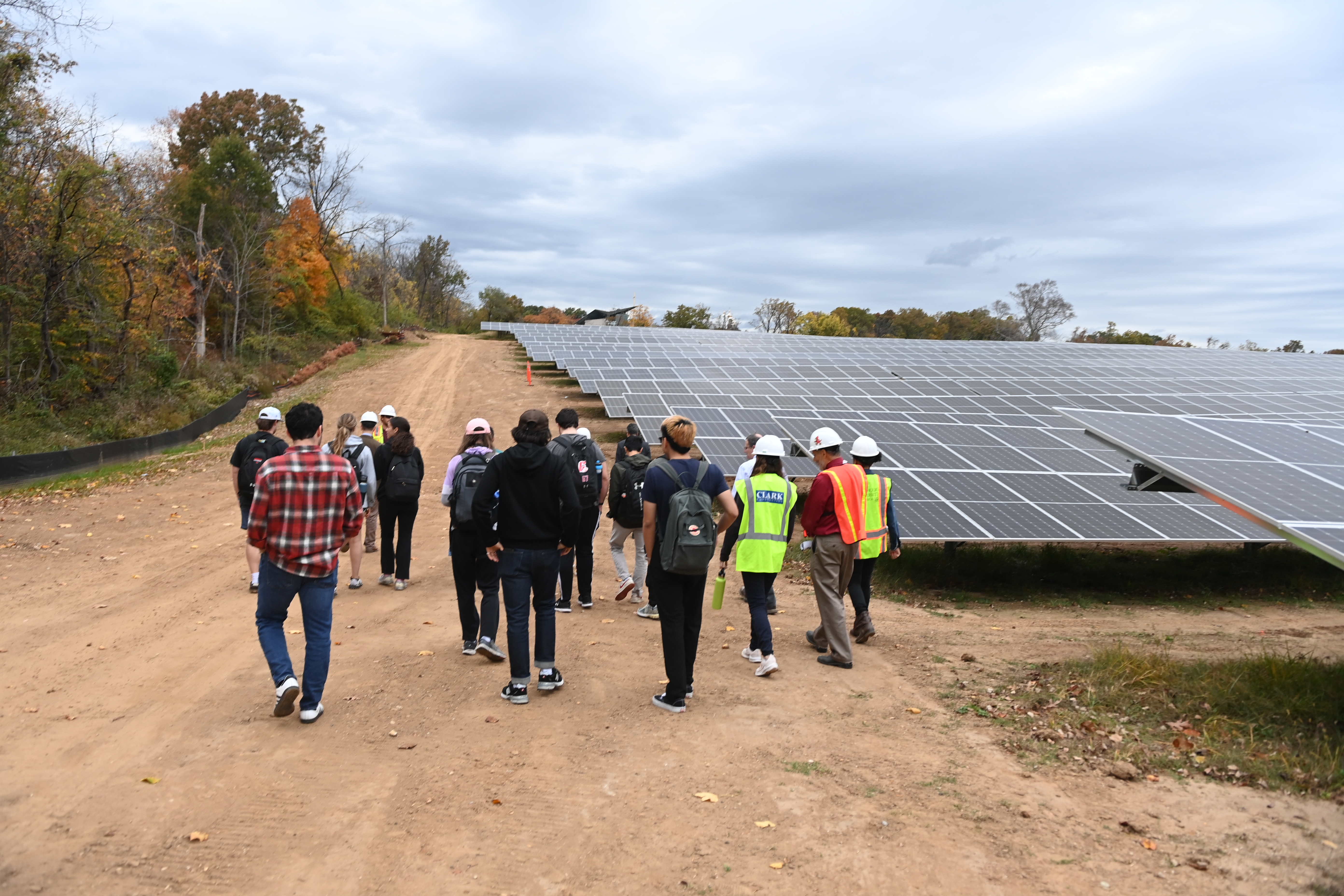The Catholic University of America is committed to advancing sustainability across our campus and beyond. Our sustainability plan outlines goals and strategies for reducing our environmental impact and promoting a more sustainable future. This sustainability progress report highlights our accomplishments over the past year.
- We are proud to report that our carbon emissions have declined by 39% compared to FY 2016 levels.
- We were named a U.S. Department of Education 2024 Green Ribbon School.
- We received the 2024 Clean Energy DC Award.
- We achieved LEED Silver certification for Garvey Hall, our new dining commons.
- We completed construction of the West Campus Solar Project and pursued new and exciting engagement touchpoints.
FY 2024’s initiatives extended to every aspect of campus life including lecture halls, residence halls, offices, and on the field. These achievements are a reflection of our ongoing pledge to Care for Our Common Home.
Pillar 1: Catholic Identity - Living Laudato Si'
Living Laudato Si’ goals and milestones are grounded in the University’s mission and identity as The Catholic University of America. FY 2024 initiatives included:
- Reducing carbon emissions by 39% compared to FY 2016 levels.
- Offsetting 100% of electricity with renewable energy credits.
Pillar 2: Leadership and Recognition
Leadership and recognition goals and milestones are focused on elevating Catholic University’s profile and visibility in the sustainability field locally and nationally. FY 2024 initiatives included:
- Collaborating with Washington, D.C.-area universities as part of the District of Columbia Mayor’s College and University Sustainability Pledge and the District of Columbia Sustainable Energy Utility’s College and University Roundtable Series.
- Participating in the DC Region’s CHEERS working group focused on advancing sustainability education across all campuses in the DC region.
- Achieving LEED Silver certification for Garvey Hall and pursuing LEED certification for the new nursing and sciences building.
- Earning recognition by seven organizations for sustainability best practices:
- U.S. Department of Education 2024 Green Ribbon School
- 2024 Clean Energy DC Award
- Green College - Princeton Review
- Bronze-Level Bicycle Friendly University - League of American Bicyclists
- Tree Campus Higher Education Recognition - Arbor Day Foundation
- 9th Top Performer in the Energy Category - AASHE Sustainable Campus Index
- 6th Most Sustainable Campus in the U.S. - UI World Green Metric
- 563rd Most Sustainable Campus in the World - UI World Green Metric
Pillar 3: Campus Facilities and People, Planet and Prosperity
FY 2024 initiatives focused on improving the health and wellbeing of our people, planet, and prosperity included:
Energy
- Reducing total energy use by 4% compared to FY 2016 levels.
- Completing construction of the West Campus Solar project.
Water
- Installed 14 new stormwater management devices at the West Campus Solar Array and Conway School of Nursing.
- Achieving a 42% ongoing-consumables diversion rate.
- Implementing a back-of-house compost program for all food waste generated in the campus kitchens.
- Planting 190 trees across campus.
- Maintaining a year-round food pantry.
- Maintaining the campus community garden to improve community access to healthy foods.
- Installing a pedestrian pathway near Flather Hall and Observatory Walk.
-
Catholic University Community Garden
In Spring 2024, the Catholic University community garden was awarded a grant by the D.C. Department of Energy and Environment and the Chesapeake Bay Trust to expand the production capacity of the garden. We are installing new raised garden beds including an ADA accessible raised garden bed and a small greenhouse. These new beds will drastically increase our production capacity and ensure that all community members are able to volunteer and benefit from spending time in the garden.
Pillar 4: Engagement
FY 2024 initiatives focused on engaging our students, staff, faculty, and broader community included:
- Recovering over 4,000 pounds of donations, including clothing, bedding, and residence hall room essentials during the first-ever spring and fall move out donation drives.
- Hosting the first-ever move in free sale to offer clothing, bedding, and residence hall room essentials to students for free at the start of the fall semester.
- Growing over 600 pounds of produce in the community garden and donating it to Cardinal Cupboard, the on-campus food pantry.
- Welcoming 400 patrons and facilitating over 1,400 thrifts in Cardinal Closet, the free on-campus thrift store.
- Rescuing 644 pounds of food from Dining Services and campus events through a partnership with Food Rescue US - DC Chapter.
- Hosting 2 community electronic waste recycling events that collected 5,195 pounds of waste.
- Hosting the first-ever campus wide office supply swap for staff and faculty to reduce waste in campus offices.
- Certifying 10 campus offices during the first-ever Green Office Certification Program for staff and faculty offices on campus.
- Adding Office of Campus Sustainability information to faculty orientation sessions.
- Hiring 4 sustainability interns throughout the academic year.
- Hosting 1 community tree planting event on campus in partnership with Casey Trees.
- Leading 9 campus sustainability and campus tree tours.
- Leading 1 Wednesday Wellness Walk in partnership with Fitness & Recreation focused on campus trees.
- Bringing 4 beehives to campus in collaboration with the DC Beekeepers Alliance.
-
Move In Free Sale
Following the success of the Move Out Donation Drive at the end of the spring 2023 semester, the Office of Campus Sustainability hosted the first ever move in free sale in August 2023. The goal of the free sale was to offer all the items donated during the donation drive back to students at the start of the fall semester to encourage reuse and foster a zero waste mindset among our students. Students were enthusiastic about the event, and nearly every item donated was claimed. The few remaining items were donated to Goodwill. -
Office Supply Swap
In June 2023, the Office of Campus Sustainability hosted the first-ever campus-wide Office Supply Swap. All staff and faculty offices were invited to clean out items they no longer wanted or needed and drop them off in the Pryzbyla Food Court the first morning of the two-day event. Offices dropped off a diverse array of items ranging from projectors to binders, coffee makers, staplers, craft supplies, and much more. All staff and faculty were then invited to peruse the donated items and claim anything they needed for their offices. Any items that remained at the end of the event were included in the Fall 2023 move in free sale for students, recycled, or donated to Goodwill. The event was such a success that moving forward, it will be offered annually. -
Green Office Certification Program
In the Fall 2023 semester, the Office of Campus Sustainability piloted the first-ever Green Office Certification Program. The Green Office Certification Program provides actionable steps for staff and faculty to integrate sustainability into their daily work and office culture. Ranging from turning off electronics when not in use to promoting sharing and reusing office supplies, these steps are no-cost ways to reduce waste; reduce energy, water, and purchasing costs; and create a healthier work environment for everyone. During the first iteration of this program, ten campus offices were certified as Green Offices: the Alexandria Center, the Center for Teaching Excellence, the Department of Psychology, the Nest: Office of Campus Activities and Center for Cultural Engagement, the Office of the Dean, Arts & Sciences, the Power Plant, Second Floor Offices, Technology Services, the Tucson Program, University Libraries: Rare Books, and University Libraries: Special Collections.
Impact
The Sustainability Plan FY 2021-2025 challenges the University to achieve five-year outcomes. The 2016 fiscal year is used as the baseline as this was the last full year of data before the University began construction on the Energy Project. Metrics are tracked on at least a quarterly basis through utility bill analysis, sub-metering, platforms, and other data outputs. Below is a summary of the latest environmental key performance indicators.


